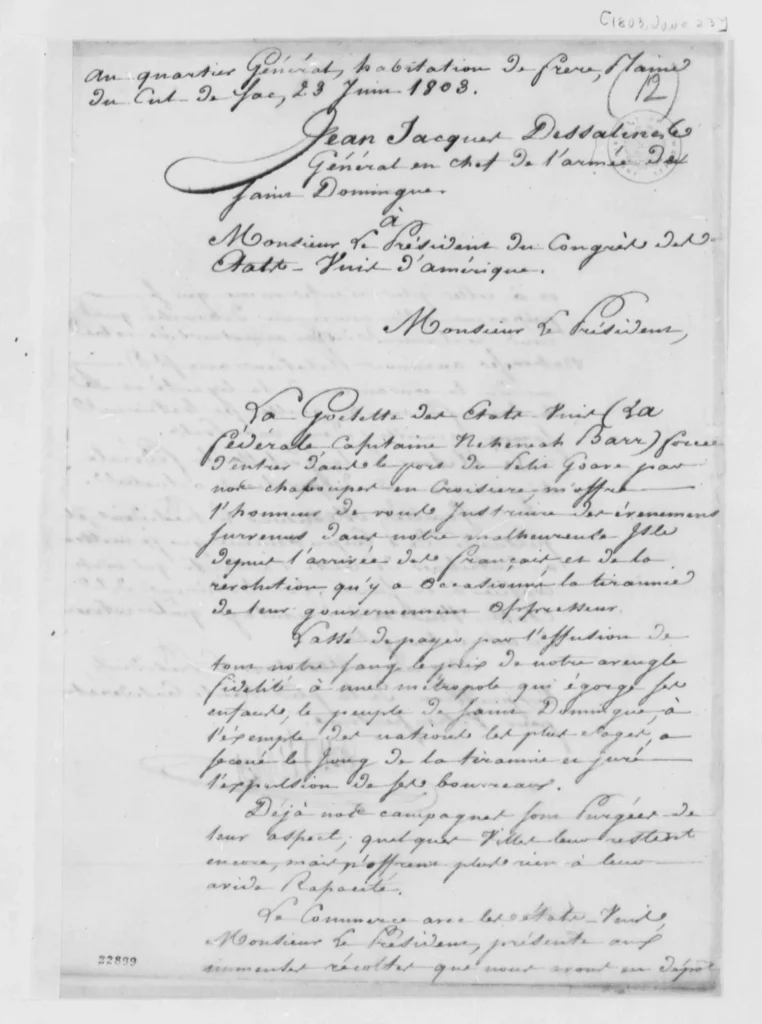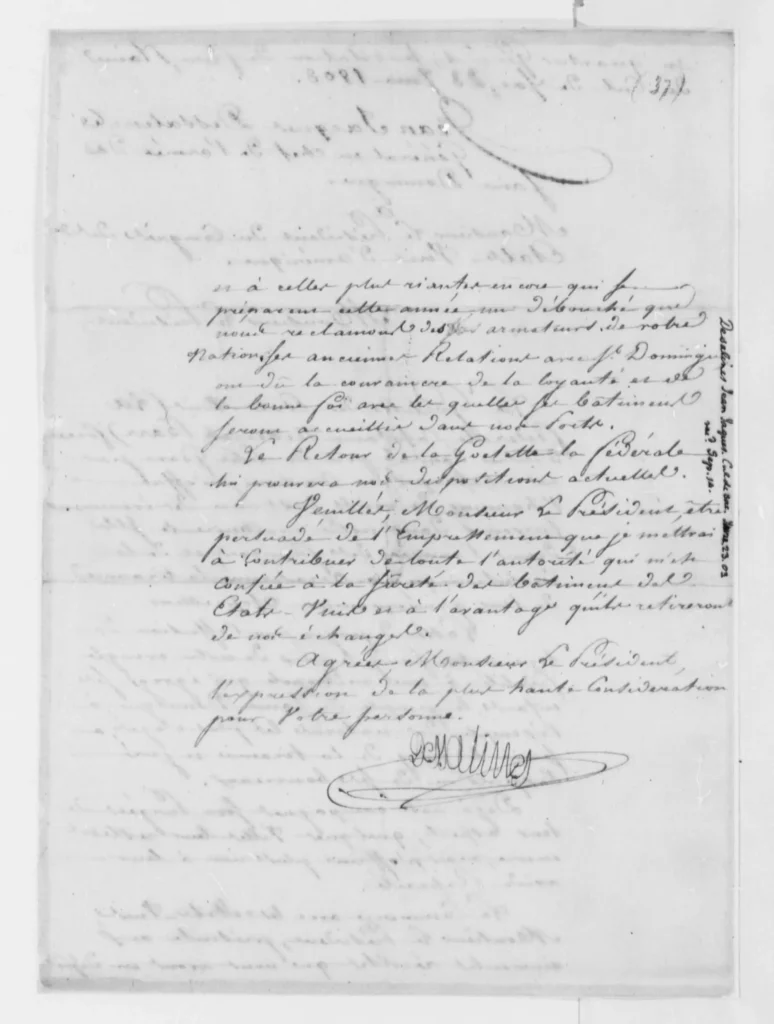Physical Address
304 North Cardinal St.
Dorchester Center, MA 02124
Physical Address
304 North Cardinal St.
Dorchester Center, MA 02124

Jean-Jacques Dessalines’ Letter to President Thomas Jefferson: A Declaration of Partnership in Turbulent Times
In the annals of history, the Haitian Revolution stands as a monumental assertion of freedom, resistance, and triumph. Jean-Jacques Dessalines, the General-in-Chief of the Haitian army, played a central role in carving this path to liberation. His letter dated June 23, 1803, addressed to Thomas Jefferson – then President of the United States Congress – reflects a moment when Haiti, still embroiled in its struggle for independence, sought to establish its place on the global stage. Sent from the Verres Plantation headquarters, this correspondence encapsulated both a pragmatic proposition of trade and a bold affirmation of Haiti’s revolutionary ethos as a beacon of democracy in a world riddled with imperialism.

Dessalines’ letter opens with a gesture of camaraderie toward the United States, mentioning Captain Nathaniel Barr as the bearer of friendship between the two entities. In acknowledging the visit of a U.S. official to Saint-Domingue, Dessalines interprets this initiative as a gesture of sincerity and trust. His words underline a shared spirit of loyalty, drawing parallels between Haiti’s struggle for liberty and the democratic ideals that ostensibly defined the American vision.
Haiti’s fledgling revolution was on the cusp of victory, with many territories already reclaimed from French control. However, Dessalines’ words reveal more than military confidence. They underscore mutual economic interests. He speaks of trade relations with the U.S., emphasizing the readiness of Haiti’s ports to welcome American ships. Here, Dessalines positions Haiti not only as a land of resilience and inspiration but as an emerging trading partner. The rhetoric skillfully ties revolutionary success with mutual commercial gain, appealing to Jefferson’s pragmatic sensibilities.
At the heart of Dessalines’ communication lies a profound comparison between Haiti and the colonial powers. He eloquently juxtaposes “the only democracy of the New World” with the tyrannies that oppress good citizens. Even as the Revolution raged on Saint-Domingue’s soil, Dessalines was making a powerful case that Haiti stood for more than its independence. It stood for the universal ideals of liberty, equity, and the rights of all people. This message, though directed at Jefferson, carried echoes intended for a broader audience – for Haiti sought recognition not just as a free nation but as one adhering to unassailable democratic principles.
However, Dessalines was no idealist, blind to reality. Aware of Jefferson’s complicity in slavery and his government’s unease with an independent Black state, he tempered his language with pragmatic diplomacy. By stressing trade benefits and goodwill, Dessalines sought to mitigate these tensions while advancing a case for partnership.

Much of Dessalines’ vision for Haitian-American relations revolved around commerce. He presented Haiti as a land ready to contribute to the exchange of goods, mutual respect, and national prosperity. By fostering ties with Haiti, the U.S. could not only secure imports and markets but strengthen relations with a nation whose revolutionary resilience mirrored its own revolutionary origins.
Yet, Dessalines’ letter also carried an implicit warning. Haiti’s alliances could sway differently if its overtures of friendship were not reciprocated. As the revolutionary war edged toward victory, the support or neglect of nations like the United States would weigh heavily on how Haiti forged its path forward.

Jean-Jacques Dessalines’ letter reflects his intricate understanding of geopolitics and diplomacy, even as he led a brutal war of independence. It reveals his dual identity as both a fiery revolutionary and a shrewd leader. His words called for collaboration, highlighted Haiti’s democratic ideals, and demonstrated the strategic necessity of economic partnerships. However, beneath the polished language was also the quiet defiance of a leader who knew his nation could thrive regardless of external approval.
As Dessalines closed his correspondence with assurances of esteem and confidence in the people of the United States, his message was clear. Haiti’s fight was not just for itself but for the ideals it hoped to share with the world. And while seeking Jefferson’s friendship, Dessalines reminded him – and history – that Haiti’s independence was a moral, economic, and political inevitability.
Let this letter serve as a testament to the foresight of one of Haiti’s greatest leaders and a foundation for reflecting on our own commitments to justice, liberation, and mutual prosperity.